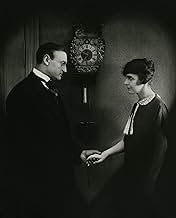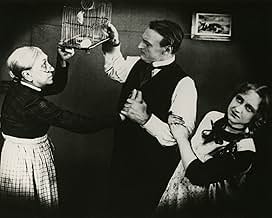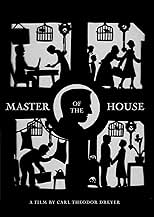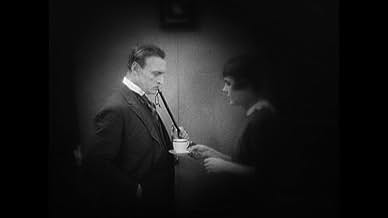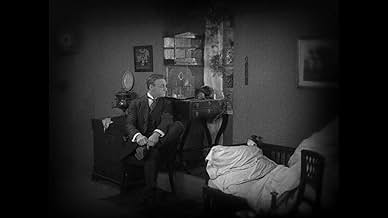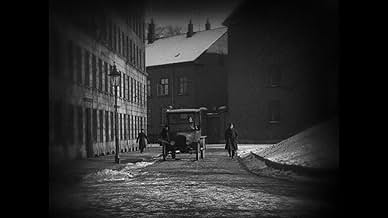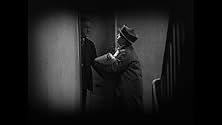AVALIAÇÃO DA IMDb
7,0/10
2,5 mil
SUA AVALIAÇÃO
Adicionar um enredo no seu idiomaWhen a man becomes tyrannical towards his family, the women of the house decide to teach him a lesson in gratitude.When a man becomes tyrannical towards his family, the women of the house decide to teach him a lesson in gratitude.When a man becomes tyrannical towards his family, the women of the house decide to teach him a lesson in gratitude.
- Direção
- Roteiristas
- Artistas
Avaliações em destaque
The thing that struck me most about this film is how progressive it is though maybe not by today's standards. In a modern film Ida would be setting out for a divorce and establishing herself into a career and provided for her own but this is a film that revolves around a man learning to appreciate the work that his wife does and even coming to realize that while he earns the money, she has the harder job.
With the many different faces that the feminist movement has taken over the years this early step of correcting a man who has taken his wife for granted was especially meaningful for me. I'm not a business owner so it feels like there are many things that are out of my control to help women. I can't raise their wages or give them healthcare they need or even, as a poor person, help them get out of bad living situations.
What I can do, and is easier to forget than I would like to admit, is be gracious and kind, thankful that my wife is who she is and works as hard as she does.
As our culture has turned itself on its head with such an extreme form of Capitalism, it is easy to forget that the main function of a home is not to give wage earners a place to eat and sleep till they go back out into the world but rather, the other way around. The wage earner leaves the home to provide money so that the family, the home, can be a place people want to spend time and company within.
In this film, Viktor has it upside down and the women in his life see it. When he does not respond to verbal cues, they give him a last chance to learn, though it will be a hard lesson to swallow. In many ways this is a profoundly feminist film. The lead male is the only character who is seen as ignorant of his actions effects and he is the only one so stubborn as to believe that he is always in the right.
With the many different faces that the feminist movement has taken over the years this early step of correcting a man who has taken his wife for granted was especially meaningful for me. I'm not a business owner so it feels like there are many things that are out of my control to help women. I can't raise their wages or give them healthcare they need or even, as a poor person, help them get out of bad living situations.
What I can do, and is easier to forget than I would like to admit, is be gracious and kind, thankful that my wife is who she is and works as hard as she does.
As our culture has turned itself on its head with such an extreme form of Capitalism, it is easy to forget that the main function of a home is not to give wage earners a place to eat and sleep till they go back out into the world but rather, the other way around. The wage earner leaves the home to provide money so that the family, the home, can be a place people want to spend time and company within.
In this film, Viktor has it upside down and the women in his life see it. When he does not respond to verbal cues, they give him a last chance to learn, though it will be a hard lesson to swallow. In many ways this is a profoundly feminist film. The lead male is the only character who is seen as ignorant of his actions effects and he is the only one so stubborn as to believe that he is always in the right.
...that explores the deterioration of a relationship of a husband and wife in Denmark after the man has lost his business. He becomes, not only morose, but extremely nasty towards his entire family, channeling all of his own personal misery towards his wife, his mother-in-law, his children, and his former nanny.
The first half of this film will win few viewers' sympathy concerning the husband. Frankly, in most of today's world, especially in the USA, any wife would have walked long ago rather than put up with such abuse. Instead, we see a form of mores that existed in a culture of yesterday, where this particular wife still holds great affection for her husband. Carl Theodore Dreyer does a commendable job showing the breakdown of the situation into its component parts, the breakup of the relationship, not by the wife, but by the nanny and mother-in-law, and then the re-assembling of the pieces into a concordant whole again. It's beautifully done, but it's dated. The major star of the piece is Mathilde Nielsen who plays the former nanny of the husband. Her eyes alone are worth the show.
This is well worth the watch but be forewarned that this is not necessarily a very pleasant piece, and I found as much to frown as to smile about.
The first half of this film will win few viewers' sympathy concerning the husband. Frankly, in most of today's world, especially in the USA, any wife would have walked long ago rather than put up with such abuse. Instead, we see a form of mores that existed in a culture of yesterday, where this particular wife still holds great affection for her husband. Carl Theodore Dreyer does a commendable job showing the breakdown of the situation into its component parts, the breakup of the relationship, not by the wife, but by the nanny and mother-in-law, and then the re-assembling of the pieces into a concordant whole again. It's beautifully done, but it's dated. The major star of the piece is Mathilde Nielsen who plays the former nanny of the husband. Her eyes alone are worth the show.
This is well worth the watch but be forewarned that this is not necessarily a very pleasant piece, and I found as much to frown as to smile about.
Exceptional because 90% of the story is set in an apartment but does not bore the viewer.The main credit to the movie should go to the writers.Although the story is mainly serious many of the lines show well thought out humor.It's already been brought out how the film is a step back in time showing how a typical Danish family might of went about doing daily chores in that era.At times it has the look of being filmed for future generations to study.Seeing a person carrying a tub of clothes up a few flights of stairs can generate a lot of appreciation for a clothes dryer.The few outdoor scenes were of interest also as they reflected a lifestyle of the past.Yes the story is of a a bad husband/father mistreating the family.To add to his fearful image he seems to be a huge man.This may be best noted in a closeup scene of his hand and the oldest daughter's hand together,the difference in size is great.The emphasis on his being a tyrant is great also but quite believable.The wife's slave like existence is laid on thick and is not quite so believable.The doubt here being brought about by her total lack of verbal response to the husbands unreasonable comments.She just puts her head down and obeys.Her role is almost 100% fairytale like.Compared to her Cinderella might seem sassy.The mentioning of the wife's lack of protest is an observation not an criticism (it's not easy to make that sound right).Anyone with only a slight interest in this subject matter will probably still be entertained by this movie.
Du Skal ære Din Hustru / Master of the House (1925) :
Brief Review -
One of the earliest films to break the silence on the domestic tyranny of husbands over housewives. A commandment for all men: "Thou Shalt Honour Thy Wife." I never really imagined an unorthodox filmmaker like Carl Theodor Dreyer making such a simple film with a sweet message. So Master of the House was like a notion breaker for me, and it also made me realise the fact that Dreyer was a master of all genres and various topics, that too in different cinema industries. This was a Danish film - a cinema industry that wasn't fully exposed to the pathbreaking cinema at that time. Yet, Carl brought them a pathbreaking topic without going beyond mainstream theories of society. Now this one is deeper and closer than it appears because it takes you inside a house. The film shows you the happenings we all see in every alternate family and almost every next couple. We all witness such things even today, almost a century later. So you can imagine the power and importance of this concept brought to light by Carl Theodor Dreyer. It was one of the earliest films to break the silence on domestic violence, verbal abuse, ill-treatment, and humiliation faced by common housewives. I am a man, but I felt for her, and I hated the man here, and I also liked the change in his behavior. That was predictable, though, and still extremely lovable. When a man loses his job, he becomes tyrannical towards his family and the women of the house. A nanny and mother-in-law decide to teach him a lesson in gratitude, or to the entire fraternity of male dominance for that matter. Astrid Holm makes a housewife that you'll love to have in your life, while Mathilde Nielsen's portrayal wins your heart. Carl Theodor Dreyer's film is sweet, simple and beautiful, but most importantly, it teaches all men to honour their wives, who tirelessly rub the house 27x7 for them.
RATING - 7.5/10*
By - #samthebestest.
One of the earliest films to break the silence on the domestic tyranny of husbands over housewives. A commandment for all men: "Thou Shalt Honour Thy Wife." I never really imagined an unorthodox filmmaker like Carl Theodor Dreyer making such a simple film with a sweet message. So Master of the House was like a notion breaker for me, and it also made me realise the fact that Dreyer was a master of all genres and various topics, that too in different cinema industries. This was a Danish film - a cinema industry that wasn't fully exposed to the pathbreaking cinema at that time. Yet, Carl brought them a pathbreaking topic without going beyond mainstream theories of society. Now this one is deeper and closer than it appears because it takes you inside a house. The film shows you the happenings we all see in every alternate family and almost every next couple. We all witness such things even today, almost a century later. So you can imagine the power and importance of this concept brought to light by Carl Theodor Dreyer. It was one of the earliest films to break the silence on domestic violence, verbal abuse, ill-treatment, and humiliation faced by common housewives. I am a man, but I felt for her, and I hated the man here, and I also liked the change in his behavior. That was predictable, though, and still extremely lovable. When a man loses his job, he becomes tyrannical towards his family and the women of the house. A nanny and mother-in-law decide to teach him a lesson in gratitude, or to the entire fraternity of male dominance for that matter. Astrid Holm makes a housewife that you'll love to have in your life, while Mathilde Nielsen's portrayal wins your heart. Carl Theodor Dreyer's film is sweet, simple and beautiful, but most importantly, it teaches all men to honour their wives, who tirelessly rub the house 27x7 for them.
RATING - 7.5/10*
By - #samthebestest.
"A drama," they call it, and true enough, a drama it is. But to an extent this is a film that somewhat occupies a strange place. The content defining the first 45 minutes or is strikingly dark - any basic premise of the movie refers to male figure Viktor as a "tyrant," but that alone is too kind a word to describe his monstrous behavior and cruel disposition. The tone that 'Master of the house' adopts is much too light to wholly impart the horrid abuse he inflicts upon his wife, his children, and everyone else around him, which with a mere change of technical composition would be fitting for a more modern, grittier rendition. At the same time, the described comeuppance he slowly comes to receive is indeed gratifying, and conveys much needed levity to offer counterbalance to the severity of the first act. Even as the picture ultimately ends as we anticipate, there's sufficient somber realism in the course of events that frankly a content warning is necessary in light of Viktor's iniquities and his family's victimization.
With all that said, however, there's also no mistaking that the miasma serves to build a wonderfully engrossing, compelling story. The adapted screenplay concocted between director Carl Theodor Dreyer and playwright Svend Rindom is filled with vivid, engaging scene writing, and strong characters who have real arcs. The narrative is unexpectedly rich and satisfying as it plays with timeless themes of family, responsibility, and humility. Plenty of other movies over the years have toyed with similar notions in different ways and to varying degrees of success, yet to whatever measure comparisons can be drawn, 'Master of the house' still comes off as a title all its own, with a precise, pleasing mixture of drama and lightly comedic elements. Moreover, at length it's terrifically endearing in its heartfelt sincerity, communicating important social messaging as Viktor learns what is most important.
One must note the swell contributions of everyone on hand, including those behind the scenes working in costume design, hair and makeup, and set design and decoration. Dreyer's direction - guiding the cast, arranging shots and scenes, and helming the production generally - is sturdy and capable, as is his editing. Above all, though, the cast is a delight. Johannes Meyer gives an exquisite performance as Viktor, illustrating super range and poise in embodying the man at his most cretinous, but also in his humbled state. Playing opposite Meyer with great nuance and strength of personality, Mathilde Nielsen is a blast as nanny Mads, serving as a brilliant foil and corrective force in the home. Even the young actors depicting the children, especially Karin Nellemose as oldest daughter Karen, demonstrate fine ability even at just the start of their careers, and it's a treat to watch them all practice their craft.
Between the subject matter, the overall thrust of the plot, and the film's place in the silent era. This isn't necessarily going to be for all viewers. For any subjective difficulties that may present, however, by far I dare say this is a tremendously worthy, absorbing feature that very well stands the test of time. Rather excruciating as the first bit of the length is, when all is said and done 'Master of the house' is earnest and beautiful, and rewarding as a viewer. Anyone who isn't turned off by what a mere glance may portend would do well to sit for it, and I think there's enough value here that enough those who tend to resist silent pictures may still find it worthwhile. Long story short, if you have the chance to watch 'Master of the house,' I think these are 107 minutes that hold up very well almost 100 years later!
With all that said, however, there's also no mistaking that the miasma serves to build a wonderfully engrossing, compelling story. The adapted screenplay concocted between director Carl Theodor Dreyer and playwright Svend Rindom is filled with vivid, engaging scene writing, and strong characters who have real arcs. The narrative is unexpectedly rich and satisfying as it plays with timeless themes of family, responsibility, and humility. Plenty of other movies over the years have toyed with similar notions in different ways and to varying degrees of success, yet to whatever measure comparisons can be drawn, 'Master of the house' still comes off as a title all its own, with a precise, pleasing mixture of drama and lightly comedic elements. Moreover, at length it's terrifically endearing in its heartfelt sincerity, communicating important social messaging as Viktor learns what is most important.
One must note the swell contributions of everyone on hand, including those behind the scenes working in costume design, hair and makeup, and set design and decoration. Dreyer's direction - guiding the cast, arranging shots and scenes, and helming the production generally - is sturdy and capable, as is his editing. Above all, though, the cast is a delight. Johannes Meyer gives an exquisite performance as Viktor, illustrating super range and poise in embodying the man at his most cretinous, but also in his humbled state. Playing opposite Meyer with great nuance and strength of personality, Mathilde Nielsen is a blast as nanny Mads, serving as a brilliant foil and corrective force in the home. Even the young actors depicting the children, especially Karin Nellemose as oldest daughter Karen, demonstrate fine ability even at just the start of their careers, and it's a treat to watch them all practice their craft.
Between the subject matter, the overall thrust of the plot, and the film's place in the silent era. This isn't necessarily going to be for all viewers. For any subjective difficulties that may present, however, by far I dare say this is a tremendously worthy, absorbing feature that very well stands the test of time. Rather excruciating as the first bit of the length is, when all is said and done 'Master of the house' is earnest and beautiful, and rewarding as a viewer. Anyone who isn't turned off by what a mere glance may portend would do well to sit for it, and I think there's enough value here that enough those who tend to resist silent pictures may still find it worthwhile. Long story short, if you have the chance to watch 'Master of the house,' I think these are 107 minutes that hold up very well almost 100 years later!
Você sabia?
- CuriosidadesAt its original release in Paris, France, this film played in 57 theaters in three weeks.
- Citações
Opening Title Card: In the numerous streets of the Big City, house follows house, and in those houses, people live in layers - like wild birds carving their nests into the rock... nest above nest...
- Versões alternativasA 107-minute version with English intertitles and an uncredited piano score was shown on the Turner Classic Movies (TCM) channel in 2006. It had no crew credits other than the director (as Carl Dreyer) and only three cast members: Johannes Meyer (as Johs Meyer), 'Astrid Holm' and Mathilde Nielsen. The English names used were John and Mary for the husband and wife, presumably to indicate a typical family, and "Nana" for the Wetnurse. The two older children were called Kathleen and Dick.
- ConexõesEdited into Mathilde Nielsen - Kavalkade (1941)
Principais escolhas
Faça login para avaliar e ver a lista de recomendações personalizadas
- How long is Master of the House?Fornecido pela Alexa
Detalhes
- Tempo de duração
- 1 h 51 min(111 min)
- Mixagem de som
- Proporção
- 1.33 : 1
Contribua para esta página
Sugerir uma alteração ou adicionar conteúdo ausente

